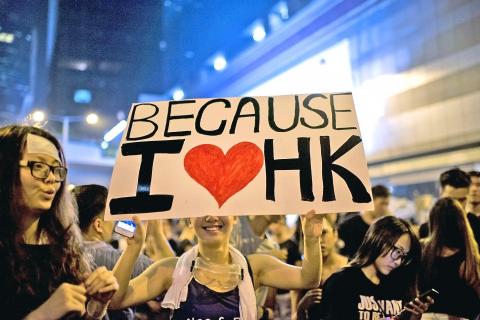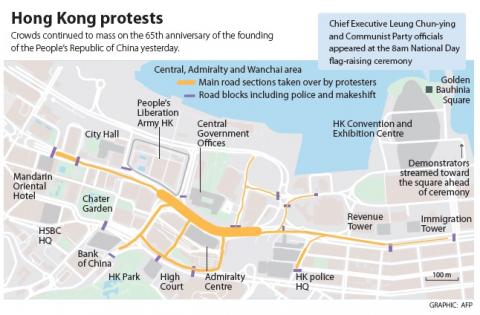Thousands of pro-democracy protesters thronged the streets of Hong Kong yesterday, some of them jeering China’s National Day celebrations, while students threatened to ramp up demonstrations if the territory’s pro-Beijing leader did not step down.
There was little sign of momentum flagging on the fifth day of the “Occupy Central” protest, whose aim has been to occupy sections of the territory, including around the Central financial district, in anger at a Chinese decision to limit voters’ choices in a 2017 leadership election.
Many had feared police would use force to move crowds before yesterday’s celebrations marking the anniversary of the foundation of the People’s Republic of China in 1949. Those fears proved unfounded and police stayed in the background.

Photo: AFP
The crowds have brought large sections of the Asian financial hub to a standstill, disrupting businesses from banks to jewelers. There were no reports of trouble yesterday, but witnesses said the number of protesters swelled in the evening.
Student leader Lester Shum (岑敖暉) issued an ultimatum to Hong Kong Chief Executive Leung Chun-ying (梁振英): Step down or else face wider protests.
“We will escalate the action if C.Y. Leung doesn’t resign by tonight or tomorrow night. We will occupy more government facilities and offices,” Shum told reporters, without elaborating. “I believe the government is trying to buy more time. They want to use tactics, such as sending some people to create chaos, so that they would have a good reason to disperse the crowd.”

Photo: AFP
Riot police had used tear gas, pepper spray and baton charges at the weekend to try to quell the unrest, but tensions have eased since then as both sides appeared ready to wait it out, at least for now.
The protests are the biggest in Hong Kong since China resumed its rule of the former British colony in 1997. They pose one of the biggest political challenges for Beijing since it violently crushed pro-democracy protests in Tiananmen Square in 1989.
A government source with ties to the chief executive said Leung and his advisers planned to soften their approach.

“It may take a week or a month, we don’t know. Unless there’s some chaotic situation, we won’t send in riot police... we hope this doesn’t happen,” the source said.
China has dismissed the protests as illegal, but in a worrying sign for the Chinese Communist Party leadership in Beijing, the pro-democracy protests have spread to neighboring Macau.
Yesterday, the Hong Kong demonstrations moved into Tsim Sha Tsui, a shopping area popular with mainland Chinese visitors. It would normally be doing roaring trade during the National Day holiday.
Underlining nervousness among some activists that provocation on National Day could spark violence, protest leaders urged crowds not to disturb the flag-raising ceremony on the Victoria Harbour waterfront.
The event went ahead peacefully, although scores of students who ringed the ceremony at Bauhinia Square booed as the national anthem was played.
A beaming Leung shook hands with supporters waving the Chinese flag, even as protesters who want him to stand down chanted: “We want real democracy.”
“We hope that all sectors of the community will work with the government in a peaceful, lawful, rational and pragmatic manner... and make a big step forward in our constitutional development,” Leung said in a speech.
Rights groups said that a number of mainland Chinese activists supporting the protests had been detained or intimidated by police.
Mainland Chinese visiting Hong Kong had differing views on the demonstrations.
“For the first time in my life, I feel close to politics,” said a tourist from Beijing surnamed Yu. “I believe something like this will happen in China one day.”
However, a woman surnamed Lin, from the southern Chinese city of Shenzhen, said the protesters’ demands for a democratic election were “disrespectful to the mainland.”
“Even though the government has brought a lot of development to Hong Kong, they don’t acknowledge this,” Lin said.

Tropical Storm Gaemi strengthened into a typhoon at 2pm yesterday, and could make landfall in Yilan County tomorrow, the Central Weather Administration (CWA) said yesterday. The agency was scheduled to issue a sea warning at 11:30pm yesterday, and could issue a land warning later today. Gaemi was moving north-northwest at 4kph, carrying maximum sustained winds near its center of up to 118.8kph and gusts of 154.8kph. The circumference is forecast to reach eastern Taiwan tomorrow morning, with the center making landfall in Yilan County later that night before departing from the north coast, CWA weather forecaster Kuan Shin-ping (官欣平) said yesterday. Uncertainty remains and

SEA WARNING LIKELY: The storm, named Gaemi, could become a moderate typhoon on Wednesday or Thursday, with the Taipei City Government preparing for flooding A tropical depression east of the Philippines developed into a tropical storm named Gaemi at 2pm yesterday, and was moving toward eastern Taiwan, the Central Weather Administration (CWA) said. Gaemi could begin to affect Taiwan proper on Tuesday, lasting until Friday, and could develop into a moderate typhoon on Wednesday or Thursday, it said. A sea warning for Gaemi could be issued as early as Tuesday morning, it added. Gaemi, the third tropical storm in the Pacific Ocean this typhoon season, is projected to begin moving northwest today, and be closest to Taiwan on Wednesday or Thursday, the agency said. Today, there would likely

DISRUPTIONS: The high-speed rail is to operate as normal, while several airlines either canceled flights or announced early departures or late arrivals Schools and offices in 15 cities and counties are to be closed today due to Typhoon Gaemi, local governments announced last night. The 15 are: Taipei, New Taipei City, Taoyuan, Tainan, Keelung, Hsinchu and Kaohsiung, as well as Yilan, Hualien, Hsinchu, Miaoli, Chiayi, Pingtung, Penghu and Lienchiang counties. People should brace for torrential rainfall brought by the storm, with its center forecast to make landfall on the east coast between tonight and tomorrow morning, the Central Weather Administration (CWA) said. The agency issued a sea warning for the typhoon at 11:30pm on Monday, followed by a land warning at 11:30am yesterday. As of

CASUALTY: A 70-year-old woman was killed by a falling tree in Kaohsiung as the premier warned all government agencies to remain on high alert for the next 24 hours Schools and offices nationwide are to be closed for a second day today as Typhoon Gaemi crosses over the nation, bringing torrential rain and whipping winds. Gaemi was forecast to make landfall late last night. From Tuesday night, its outer band brought substantial rainfall and strong winds to the nation. As of 6:15pm last night, the typhoon’s center was 20km southeast of Hualien County, Central Weather Administration (CWA) data showed. It was moving at 19kph and had a radius of 250km. As of 3pm yesterday, one woman had died, while 58 people were injured, the Central Emergency Operation Center said. The 70-year-old